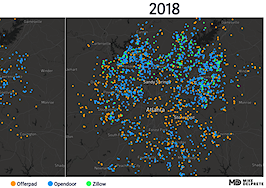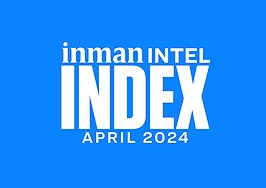How do you thrive in today’s luxury market? Don’t miss Inman’s Luxury Connect, October 15-17, 2019, in Beverly Hills, California. Walk away with the marketing, technology and luxury intelligence to grow your business while expanding your referral network with built-in networking sessions. Join 500 of the most notable names in luxury real estate. Reserve your spot here.
People have plenty of options these days when they want to buy or sell a house, and what kind of model is best for them is often hotly debated.
In some ways, the choices consumers have in residential real estate are analogous to the world of retail: High-end retail stores like Saks Fifth Avenue, Dillard’s and small high-end boutique shops occupy the “full-service” space.
Retailers such as Target and JCPenney and many smaller hometown retailers could be compared to what I call the “agent-centered model” in real estate.
Walmart and Dollar Stores are a good comparison of the discount brokerage model, with eBay and Amazon representing the final space.
Retail consumers in America know what to expect when shopping for products at specific brands. But do homebuyers and sellers know what to expect from each of the different types of brokerages present in the real estate space today?
Not necessarily, so below is a breakdown of how I see today’s real estate brokerage models and what homebuyers and sellers should expect from each model.
Full-service brokerages
Full-service brokerages have not changed much in the past 15 years, but technology has.
This kind of brokerage is responsible for nearly all of the expenses in the entire sales process, allowing the agent to completely focus on the customer experience rather than focus on dollars and cents of each transaction. These agents are typically highly trained, seek designations and come across as polished, professional and fully focused on each client.
Customer retention and referrals are of upmost importance to these agents. Brokerages spend money on advertising the brokerage brand and on articulating their value proposition to agents, buyers and sellers.
Buyers and sellers should expect expert marketing, well-trained agents, top-notch business offices where offers are written and accepted. Full color marketing brochures are present at open houses. High end marketing materials being sent out to neighbors and plenty of print and web marketing materials are provided by the brokerages, along with professional photos and even virtual tours conducted with 3D imaging and drone footage.
The buyer or seller typically know both the agent and the brokerage brand very well and are willing to pay a premium for all the professional services these brokerages offer.
Big names in the real estate franchising space like Realogy, with its brands of Coldwell Banker, Century 21 and Sotheby’s fit into this category. Many independent brokerages are defined by the term “full-service” brokerages as well.
Buyers and sellers expect high quality everything during the transactions, from professional listing presentations, professional photography, professional looking signage, professional brokerage offices, and professional looking agents. Buyers and sellers would pay a premium when choosing these differentiated brokerages.
Agent-centered brokerages
Agent-centered brokerages have grown tremendously in the past 20 years. Re/Max, Keller Williams, Exit Realty and more recently eXp Realty are prime examples of the agent-centered brokerage model.
The brokerages empower the agent to build the brand of both the agent and the brokerage. These models are defined by academics as low cost with differentiation business models.
Agents are normally responsible for most of the costs of doing business on a day-to-day basis. With few exceptions, these brokerages spend very little money on brokerage branding through marketing and have smaller offices with fewer amenities, but do provide training and sometimes tech to help agents become more productive. Profit share or revenue share is one way these companies have attracted so many agents recently.
What should a buyer or seller expect when choosing an agent from one of these brokers?
These agents are taught from Day 1 to keep expenses low. Therefore, they typically offer less fluff and frills to a seller or buyer. Times are changing where we are seeing large teams in these models that are beginning to offer more services as a part of the team’s attempt to differentiate itself from other agents in the same brokerage.
Agent count seems more important to these companies than transaction count, and services provided to the buyer and seller are basic. However, these agent-centered brokerages are chasing new technology tbat makes the transaction easier for the agent, the buyer and the seller.
A large segment of homebuyers and sellers are comfortable with using these firms, as the seasoned agents at these brokerages are well-trained, have unique systems in place to constantly generate new leads and embrace new technology to make the transaction easier.
This brokerage model depends heavily on agents spending their own money to grow the brand name of the agent and brokerages. The costs charged to both buyers and sellers is very similar to the costs of using a full-service brokerage. However, the agent (not the brokerage) covers the majority of the costs of marketing, branding and growing the business.
RE/MAX is a rare exception in this model as it spends a fair amount of money on growing the national brand. Many of the buyers and sellers in today’s real estate market seem satisfied with this model as a large percentage of closed transaction come from these brokerages.
The discount brokerage
The discount brokerage, which has been around for a long time, is the third major model of real estate brokerages.
Defined as a low cost without differentiation, these brokerages leave most of the duties of the homeselling process to the seller. They often change a flat fee, attempt to simply get the house listed in a local MLS and the major portals and provide few services to the seller.
The initial attraction for a brokerage to this model was to work buyer leads from these listings and hope to capture buyers, really focusing on the buyer segment. Offering a flat fee to sellers, who were looking to save money by doing most of the tasks of selling the home, these brokerages have been in a race to the bottom on fees charged to the seller.
Recently, a major brokerage from the U.K., Purplebricks, left the U.S. market as it could not figure out how to turn a profit. Seldom does a race to the bottom on price succeed as once the race starts, it has the potential to end with no income being produced by companies competing in this space. Economies of scale have been hard to achieve in real estate, unlike in the retail space.
IBuyers
Today we find a fourth model of selling real estate that has gained some traction, the iBuyer model.
It looks like full-service brokerages, agent-centered brokerages and discount brokerages are all dipping their toes into this model. Years ago, the “We Buy Ugly Houses” franchise dominated the idea of directly buying homes from consumers, yet transaction counts were extremely low, as the typical seller was offered way below market value for a house.
With so many companies entering this space, money from Wall Street and investors globally, the iBuyer model is looking attractive to a small segment of homesellers.
Sellers who must sell in a short period of time, have plenty of equity and have no time to deal with the sale of house are attracted to this model. Once the house is purchased by the iBuyer, if the right repairs and improvements are completed, listing the house for sale has the potential to attract a fair amount of buyers.
With about 1.3 million Realtors, it sure seems like the real estate space has room for all of these different models.
Despite what business model agents are attracted to, well-trained and professional agents who put the clients’ needs first is what differentiates seasoned agents from all the rest.
Focusing on client retention, taking the stress out of the homebuying and selling experience and offering unique marketing, either done by brokerages or agents will still be important no matter what.
From my vantage point, agents from the full-service brokerage the agent-centered brokerages represent most of sellers and buyers today, with the discount brokerage and iBuyer model offering a service to a small sector of the market.
Buyers and sellers should understand the various real estate brokerage models before selecting an agent.
Then they can determine which brokerage models fit their needs.
Scott Friestad is the broker-owner with Friestad Realty in Shreveport, Louisiana. Connect with him on Facebook.
Reserve your spot at Luxury Connect here. Thinking of bringing your team? There are special onsite perks and discounts for team who register together. Just contact us to find out more.













